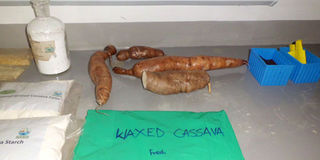From chips to flour, cassava offers a lot

Some of the cassava tubers smeared with bees wax. Photo by Lominda Afedraru .
What you need to know:
Scientists are adding value to fresh cassava for farmers to avoid damage and improve the shelf life, writes Lominda Afedraru.
Cassava is a staple crop in Uganda and is important for food security but it also has the potential for a wide range of additional uses.
These include industrial raw material for producing starch, ethanol and sweeteners and for processing into high-quality food products such as snacks and biscuits to meet increasing demand from urban consumers.
However, the crop is staple for most Ugandans from east and northern parts of the country.
They consume it in various ways by boiling the fresh roots as well as mingling the flour to be consumed with source.
But there is a huge challenge of preserving the fresh roots for such a longer period of time causing most farmers to sell what is ready in their farms at farm gate price.
Innovation
As such scientist at the National Crop Resources Research Institute (NaCRRI) in Namulonge have come up with a new innovation of preserving fresh cassava for a period of 21 days without it getting spoilt.
Dr Ephraim Nuwamanya, who heads the Bio-analytical Laboratory at the Institute, explains that his team came up with the idea of improving the shelf-life of harvested fresh cassava so that farmers are able to keep it fresh for a longer period of time in the open market.
This was as a result of a World Bank supported project which scientists tested and realised that the technology where bee wax is applied to coat fresh cassava to prolong the fresh lifespan actually worked very well.
Waxing cassava
Farmers are advised to use food grade bee wax. For every 100 kilogrammes of fresh cassava, a farmer will apply one and half kilogrammes of bees wax.
This is done after thoroughly washing the fresh cassava which has been harvested from the farm, it is left to dry so that there is no water moisture content on it and it is coated with bee wax.
A farmer can store such cassava for 21 days and it will remain fresh becoming even sweeter than before.
This is for purposes of farmers improving their output meaning they will be able to sell their harvested cassava while still fresh thereby earning better income.
Target group
Dr Nuwamanya and team are targeting farmers growing sweet cassava and selling it fresh for consumption.
Farmers in Kibaale and Fort Portal are already adopting this technology. They have the bee wax readily available since a number of them are practicing both beekeeping and growing cassava as a source of income.
The technology is targeting mainly urban dwellers who would wish to purchase clean fresh cassava in supermarkets containing no soil.
Farmers already engaged in this initiative are targeting supermarkets as the entry point of sale.
What they do is enter into an agreement with supermarkets to supply processed cassava coated with bee wax which supermarket owners must ensure is sold within 21 days from the date of coating because thereafter the cassava may go bad.
The technology is not viable for those intending to process cassava flour for making starch for industrial use.
Upon adding value to the product, the purchase price will be much higher compared to a farmer selling cassava from the garden.




